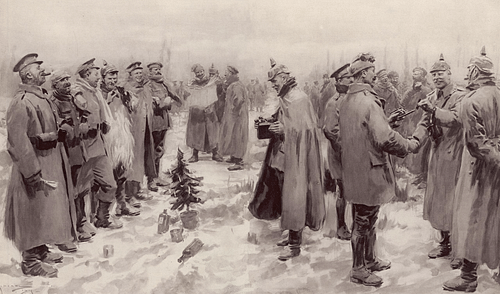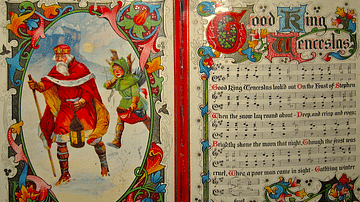
The Christmas Truce of 1914 occurred on the Western Front during the First World War (1914-18). On Christmas Eve soldiers in the trenches spontaneously agreed to a ceasefire. Beginning with the singing of Christmas carols, the unofficial truce developed into soldiers meeting in no man's land, exchanging gifts, and even playing football together.
The Trenches in December
WWI began in July 1914 and quickly turned into a war of attrition, with frontline troops of the French, German, Belgian, and British armies subjected to the tribulations and horrors of trench warfare. The trenches were abysmal places: constantly flooded, thick mud everywhere, the men constantly subjected to shell fire, machine guns, and the stench of war. One brief respite came at Christmas time, the traditional season of goodwill to all. Pope Benedict XV (in office 1914-1922) had called for a truce on 17 December. The German government agreed to the ceasefire proposal, but the other nations in the war did not.
It seemed, then, that the only consolation and source of festive cheer for the troops on all sides would be their Christmas parcels sent from home. For British troops alone, well over 500,000 parcels were sent to the front in the weeks leading up to Christmas. Parcels from home included food, sweets, cigarettes, pipe tobacco, items of warmer clothing like socks and gloves, small gifts, and, perhaps from the more imaginative relatives, a few simple Christmas decorations. British and British Empire troops, in addition to charity and family parcels, also received a special gift tin from Princess Mary (1897-1965), daughter of King George V (r. 1910-1936). The embossed brass tin, one for every single soldier, contained a Christmas card, photographs of the king and royal family, pipe tobacco, a packet of cigarettes, and a tinder lighter. For those who did not smoke, there was a version with sweets and a pencil case. The king's photograph carried on the reverse the following message: "With our best wishes for Christmas 1914. May God protect you and bring you home safe" while the Christmas card read "With best wishes for a happy Christmas and a victorious New Year" (Brown, 124). Likewise, Wilhelm II, German Emperor (r. 1888-1918) gave a present of a cigar case and cigars to all German soldiers at the front. Wilhelm, German Crown Prince (1882-1951), gave everyone a souvenir pipe with his portrait on it.
Trenches were brightened up using candles, Christmas cards, holly and mistletoe scavenged from nearby forests, and perhaps a small Christmas tree or suitable substitute. German troops, in particular, received thousands of Christmas trees sent from home, and many were placed on the parapets of the trenches. On 23 December, as if in tune with the sentiment of the soldiers, mother nature contributed to the festive scene by ending the dreadful period of rainy weather that had bedevilled the troops since early November. Instead, snow began to fall upon many sections of the front line. The frost that night finally hardened up the mud. Next morning, as Rifleman Bernard Brookes noted in his diary, the effect was "a Christmas card Christmas Eve" (Brown, 60).

Christmas Eve: Carol Singing
As Christmas Eve progressed, silence descended along the frontline trenches, with only the occasional sniper fire to break the spell. One artillery officer noted: "About 6 o'clock things were positively dead; there was not a sound. Even our own pet sniper went off duty" (Brown, 62). The same situation was reported on the German side in the diary of Lieutenant Johannes Niemann: "All was quiet. No shooting. Little snow" (Brown, 64).
As dusk settled on the trenches and the troops began to light the candles on their trees and in paper lanterns, men began to sing Christmas carols on both sides. Soon, the soldiers could hear each other as their carols drifted across no man's land. So began a series of friendly musical exchanges, as one side sang and the other applauded, then vice-versa. In a letter home, Private Oswald Tilley wrote:
They finished their carol and we thought we ought to retaliate in some way, so we sang 'The First Noël', and when we finished that they all began clapping; and then they struck up another favourite of theirs, 'O Tannenbaum'. And so it went on. First the Germans would sing one of their carols and then we would sing one of ours, until when we started up 'O Come All Ye Faithful' the Germans immediately joined in singing the same hymn to the Latin words 'Adeste Fideles'. And I thought, well, this was really a most extraordinary thing – two nations both singing the same carol in the middle of a war...This experience has been the most practical demonstration I have seen of Peace on earth and goodwill towards men…It doesn't seem right to be killing each other at Christmas time.
(Lawson-Jones, 92).
In another section of the trenches, British, French, and German soldiers all sang Silent Night together, each in their own language. As in Britain, the history of Christmas carols in French and German-speaking countries is a long one. The 19th century witnessed a boom in reviving old medieval carols like Adeste Fideles and in writing new ones. Silent Night, Holy Night (Stille Nacht! Heilige Nacht!) was composed in Austria in 1818. It was written by Joseph Mohr (lyrics), the parish priest, and Franz Gruber (melody), the schoolmaster of Hallein for performance at Christmas services because, at least according to legend, the church organ had broken down after a mouse had got into the workings and caused havoc. Silent Night seems a singularly appropriate choice of carol to mark the silencing of the great guns for this briefest of ceasefires. For many British soldiers, this was the first time they had heard the carol which later became so popular in Britain.
Messages of goodwill were shouted across no man's land, as recorded by Lieutenant Edward Hulse:
…there were wafted towards us from the trenches opposite the sounds of singing and merry-making, and occasionally the guttural tones of a German were to be heard shouting out lustily, 'A happy Christmas to you Englishmen!'
(Lawson-Jones, 91)
Meeting the Enemy
Singing was all very well, but many men were eager for a much greater demonstration of the traditional sentiments of the season. Against orders and with much initial hesitation, men on both sides climbed out of their trenches and proceeded to shake hands and chat with those they had been trying to kill only a few hours before. These impromptu conversations included promises to hold a truce the next day, Christmas Day.

Corporal John Ferguson recalled:
We shook hands, wished each other a Merry Xmas, and were soon conversing as if we had known each other for years. We were in front of their wire entanglements and surrounded by Germans – Fritz and I in the centre talking, and Fritz occasionally translating to his friends what I was saying…What a sight – little groups of Germans and British extending almost the length of our front! Out of the darkness we could hear laughter and see lighted matches, a German lighting a Scotchman's cigarette and vice versa, exchanging cigarettes and souvenirs. Where they couldn't talk the language they were making themselves understood by signs, and everyone seemed to be getting on nicely.
(Lawson-Jones, 93-4)
As midnight approached, some British troops fired rockets in celebration, as reported in a letter home from one German soldier:
Suddenly a man from my company reported: 'The English are letting off fireworks'. And sure enough across the way from us the enemy trenches were lit up with fires and rockets and so on. We then made up a few banners reading 'Happy Christmas!' With a couple of candles behind and a couple on top.
(Brown, 66)
As the night wore on, the troops returned to their beds or, as in many of the French- and Belgian-held sections, they attended impromptu midnight mass services. One humble service is here described by Robert de Wilde, a captain in the Belgian artillery:
It was freezing. The stars were shining superbly and the horizon was lit by multiple blue rockets launched from the German trenches.
The floor of a barn, with its huge double doors for background, straw on every side, draughts everywhere – that was the chapel. A wooden table and two candles stuck in bottles – that was the altar.
The soldiers were singing. It was unreal, sublime. They were singing: 'Minuit, Chrétiens', 'Adeste fideles', 'Les anges de nos compagnes', all the songs we used to sing when we were little. The Christmases of long ago were coming to life again, all the things we had known in our childhood, the family, the countryside, the fireside, our eyes dazzled by the tree with its sparkling candles…
(Brown, 81)

In the French sector, Capitaine Rimbault tells a similar story:
At midnight, we held a mass, fifty metres from the Boches, in the trenches…We had fixed up a sort of makeshift altar; from the nearby village, abandoned and in ruins, we had fetched a few candle-holders, a missal, a pyx, an altar-cloth. Debris from the forest supplied the rest. The men sang their carols, carols from their villages, from their childhood..
Throughout the whole ceremony, the Boches – Bavarian Catholics – did not fire a single shot. For an instant the God of goodwill was once more master of this corner of earth.
(Brown, 82)
Christmas Day: Exchanging Presents
As men awoke on Christmas morning, greeted by fog and a hard frost, services were held in shelled churches, village halls, or the open air. As the fog lifted, the spontaneous gatherings of friend and foe witnessed the night before continued. The more wary first put up signs such as "You don't fight. We won't fight" before venturing out of the trenches. Cautious commanders gave the order not to shoot unless absolutely necessary. In most cases, though, the ceasefire occurred quite naturally, very often with both sides recording it was the other side who first came across to their trench to call for a halt to the shooting this day. Many commanders also took the opportunity to send details to bury the dead out in no man's land, often dispatching a peace delegation to the enemy to confirm this was their intention.
The peaceful gatherings of hitherto enemies were not isolated incidents but occurred along two-thirds of the trench lines, over 450 miles (725 km) of front. Some sectors did carry on fighting, and sometimes a peace offering was rebuffed by the other side, but, as the historians M. Brown and S. Seaton note, "the truce did take place and on a far greater scale than has usually been assumed" (ix).
With no bullets flying, even the birds returned to the area. The early fog lifted. Once more, the weather played its part, providing "such a day as is invariably depicted by artists on Christmas cards" wrote Bruce Bairnsfather (Brown, 99). Despite the language barriers, men chatted, often through a much-prized interpreter, such as those men who had worked in Britain before the war. They showed each other photographs of loved ones back home and exchanged small presents or swapped rations. Cigars, wine, cognac, chocolate, and other luxuries were swapped. More mundane items were swapped out of curiosity, such as German sausages for English corned beef or schnapps for rum. Souvenir hunting was particularly popular as soldiers exchanged badges and buttons from their uniforms or from those of fallen comrades. A German spiked helmet, the distinctive Pickelhaube, was the most prized of all souvenirs on the British side.

Entertainments
As the peace continued through Christmas Day, so confidence increased and the relations grew warmer, particularly in the British versus German sections. The French and Belgian soldiers, although sometimes fraternising with the German soldiers, found it difficult to forgive the invasion of their country, and their truces were typically shorter and more formal.
Some groups put out Christmas trees in no man's land or even got down to a bit of communal feasting, roasting a pig, for example. At Frelinghien, German soldiers rolled barrels of beer across to the British trenches and exchanged them for plum puddings. There then occurred a sort of intermission as everyone returned to their trenches for their Christmas dinner of carefully saved-up food and luxuries sent from home. A stolen goose from a nearby farm, a packet of raisins, or a bottle of fine wine were welcome treats after months of tinned meat and vegetables.
In the afternoon of Christmas Day, some groups of soldiers set up football matches, although these were not perhaps as numerous as legend supposes and probably not held in no man's land given that area was always heavily cratered and littered with barbed wire.
Soldiers on both sides dressed up in outlandish costumes. Bernard Brookes reported:
Many of the Germs had costumes on which had been taken from the houses nearby, and one facetious fellow had a Blouse, Skirt, Top Hat and Umbrella, which grotesque figure caused much merriment.
(Brown, 134)
Soldiers took photographs if they had a small camera, not altogether uncommon. British newspapers had offered handsome rewards for anyone who could send them photographs of the front, a practice not yet outlawed by the high command. Even German soldiers were tempted to send photographs to the British press.

While all this fraternising was going on, there were cases on both sides of some soldiers – those who did not forget there was a war on and it would restart soon enough – investigating more exactly the enemy's positions in terms of gun emplacements and military weaknesses. These reconnaissance missions seem to have been rare, and many were counter-ordered by commanding officers as too dangerous and not in the spirit of the day.
As dusk fell on this oddest of Christmas Days, the men returned to their trenches. One German soldier summed up the general feeling when he said to a departing foreign friend who would soon be his enemy once again: "Today we have peace. Tomorrow you fight for your country; I fight for mine – good luck" (Brown, 147).
Aftermath
The Christmas Truce was reported without censorship by the British press in newspapers like the Daily Mirror and magazines such as The Illustrated London News. Very often the story made the front page, with editors including photographs from the trenches. To many in Britain, especially after the relentless propaganda that demonised the enemy ever since the war began, it all seemed like an exaggeration, but the bulky historical records of letters and photographs are proof of the surprising extent of this most unusual of Christmas truces. As one German soldier wrote: "The way we spent Christmas in the trenches sounds almost like a fairy tale" (Brown, 97). The German press, in contrast, tended to ignore the truce altogether or restrict itself to the briefest of mentions.

The truce not only involved privates but also many NCOs and officers, even as high ranks as majors and colonels. Some generals, too, knew of the truce and did nothing about it. Nevertheless, the reaction of the high command on all sides was not quite so positive, especially when some soldiers began to say they would not fight the enemy even when Christmas was done and dusted. There were then accusations of treason and calls for court martials, although no such drastic consequences occurred. In most areas where the truce was being prolonged, soldiers were using the time well to restore and improve their defences, something not possible under enemy fire.
The German high command issued an order on 29 December prohibiting any fraternisation with the enemy. Not until the following February did the British field marshals and generals begin to get a grip on all of their troops again and the war resumed its terrible course. The Christmas truce of 1914 turned out to be unique, for there was no such truce or fraternisation the next Christmas. All armies involved strictly forbade such behaviour in 1915, and, in any case, after another year of brutal fighting the urge to be friendly with the enemy, even if only temporarily, had considerably diminished. The war rumbled on, only ending with the armistice of November 1918. By then, 7 million people had been killed and 21 million seriously injured. The Christmas Truce had indeed been a fairy tale interruption in the most destructive war humanity had so far witnessed.





